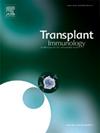肾移植患者急性排斥反应期间尿组和相关代谢特征的表征:一项初步研究。
IF 1.6
4区 医学
Q4 IMMUNOLOGY
引用次数: 0
摘要
尿微生物组或尿组的特征性改变与肾移植病理有关。到目前为止,还没有对急性同种异体移植排斥反应中尿组的直接研究。本研究的目的是确定在肾移植受者急性排斥反应中是否存在独特的尿组改变。我们对15名移植受者在移植前、移植后1个月和3个月,以及因原因活检发现排斥反应时的32份中游尿液样本进行了鸟枪宏基因组测序。在个体中,从移植前到移植后,排斥者和非排斥者的尿组组成差异为40-60 %。与非排斥分子相比,排斥分子中脲原体的含量更高。然而,除了与四环素耐药性、溶血磷脂酸合成途径和色氨酸- trna合成酶相关的基因外,非排斥者中富集的微生物基因数量多于排斥者。总之,我们的研究结果表明,移植后尿组发生了显著改变,某些分类群和/或微生物基因可能与急性同种异体移植排斥反应/炎症有关。本文章由计算机程序翻译,如有差异,请以英文原文为准。
Characterizing the urobiome and associated metabolic profiles during acute rejection in renal transplant patients: A pilot study
Characteristic alterations in the urinary microbiome, or urobiome, are associated with renal transplant pathology. To date, there has been no direct study of the urobiome during acute allograft rejection. The goal of this study was to determine if unique urobiome alterations are present during acute rejection in renal transplant recipients. We performed shotgun metagenomic sequencing of 32 mid-stream urine samples obtained from 15 transplant recipients pre-transplant, 1- and 3-months post-transplant, and at time of rejection discovered with for-cause biopsy. Within individuals, there was a 40–60 % difference in urobiome composition from pre-to-post-transplant in both rejectors and non-rejectors. The taxa Ureaplasma was enriched in rejectors compared to non-rejectors. However, a greater number of microbial genes were enriched in non-rejectors compared to rejectors, except for genes associated with tetracycline resistance, the lysophosphatidic acid synthesis pathway, and tryptophanyl-tRNA synthetase. Together, our findings suggest that the urobiome is significantly altered post-transplant with certain taxa and/or microbial genes potentially associated with acute allograft rejection/inflammation.
求助全文
通过发布文献求助,成功后即可免费获取论文全文。
去求助
来源期刊

Transplant immunology
医学-免疫学
CiteScore
2.10
自引率
13.30%
发文量
198
审稿时长
48 days
期刊介绍:
Transplant Immunology will publish up-to-date information on all aspects of the broad field it encompasses. The journal will be directed at (basic) scientists, tissue typers, transplant physicians and surgeons, and research and data on all immunological aspects of organ-, tissue- and (haematopoietic) stem cell transplantation are of potential interest to the readers of Transplant Immunology. Original papers, Review articles and Hypotheses will be considered for publication and submitted manuscripts will be rapidly peer-reviewed and published. They will be judged on the basis of scientific merit, originality, timeliness and quality.
 求助内容:
求助内容: 应助结果提醒方式:
应助结果提醒方式:


